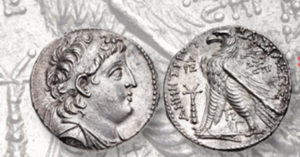
Easter. I won’t fully wrap my head around its message until I get to heaven. For now, I remain in awe of God’s love and Jesus’ sacrifice. But many people played a role in Easter’s message, including Nicodemus—who’s mentioned only in the Gospel of John.
Unlike the other Gospels, John doesn’t chronicle Jesus’ history. Instead, John writes to refute a heresy called Gnosticism that surfaced near the end of the first century. So why would John include Nicodemus, a Pharisee, in that?
Political and religious turmoil
To get to the “why,” we need to walk in Nicodemus’s shoes for a bit. In the first century, the Pharisees were at the height of their influence. Although highly respected for their morality and education, many of them had traded holy insight for religious power. They judged on the many rules and interpretations of Mosaic Law while Rome handled civil crimes.
The Roman Empire worshipped a pantheon of gods, including some they borrowed from conquered countries. The Jews’ refusal to worship any god other than Yahweh translated to a lack of loyalty in the eyes of the Roman empire, so the Pharisees trod lightly to stay in Rome’s good graces. Rome tolerated Judaism as a well-established religion with a rich cultural history; hopefully tolerance would appease the unruly Jews.
But Christianity (called “The Way” in its earliest days) was another matter. Under Roman law, no new religion could be established unless Rome sanctioned it. Otherwise, it was illegal—and subject to harsh punishment.
John inserts Nicodemus into this seething stew at three points in his Gospel. What does a long-dead Pharisee have to do with you and me? Let’s find out.
First encounter (John 3)
Early in Jesus’ ministry, Nicodemus meets with Jesus at night. Jesus initially appears to chide the Pharisee’s intellectual questions. How could Nicodemus, despite his extensive education and revered teaching as an extraordinary expositor, not understand the concept of being born again? But then Jesus explains, “Here’s how much God loves the world. He gave His only Son to save the world through Him. But people who love darkness will hate His light. Whoever loves the light will reflect what God has accomplished.” (John 3:16–21)
Takeaways
>> Jesus meets you wherever you’re at.
>> He can handle all your questions, doubts, and intellectual arguments.
Second encounter (John 7)
Somewhere between John 3 and John 7, Nicodemus fully sells out to Jesus. John 7:50 says, “Nicodemus … who himself was one of them …” (The NIV says “one of their own number.”) The Greek pronoun used here is an intensive word that emphasizes Nicodemus’s identity in contrast to other people. What he previously knew conceptually or intellectually, now Nicodemus knows experientially. Jesus is the Christ and His Lord.
By chapter 7, Jesus has performed many miracles. After John describes Jesus walking on water, he devotes two chapters to discourses Jesus has with Jewish authorities. Jesus’ answers enrage the Pharisees. The Sanhedrin’s reluctance or inability to arrest Jesus adds fuel to the fire. Nicodemus respectfully suggests the Pharisees give Jesus due process: hear Him out; don’t dismiss Him categorically as wrong or treat Him as a threat. Nicodemus’s suggestion draws insults and derision from his colleagues. They aren’t interested in discerning truth. By the time Jesus raises Lazarus back to life, the Pharisees are consumed with one worry: if Jesus’ activities continue unchecked, then “everyone will believe in Him” and “the Romans will … take away both our place and our nation.” (John 11:47-48)
Takeaways
>> Knowing Jesus will threaten your status quo. It’ll upset some people. It may overturn your livelihood. But Jesus promises something better.
>> Christianity isn’t knowing about Christ, it’s KNOWING Christ—being in relationship with Him.
Third encounter (John 19)
Nicodemus takes seventy-five pounds of myrrh and aloe to Jesus’ tomb, an extravagant gesture of respect and reverence. Unlike the women who go to the tomb after Passover to do the same, Nicodemus doesn’t wait. He knows that handling Jesus’ dead body will make him unclean—unfit to serve his priestly duties during the High Sabbath of Passover as well as the weekly Sabbath (both of which fell within the same week Jesus was crucified). But no career obligation, no threat of religious or civil backlash can usurp what the love of his Lord moves him to do.
Takeaways
>> If the Holy Spirit lives in us, we can give without measure because Christ first gave Himself for us.
>> God honors our faith and obedience.
What next?
Where are you in your journey with Jesus? Curious? Contemplative? Confounded? Committed? Nicodemus would tell you Jesus welcomes all of that—because Nicodemus’s journey is also yours. Most important, Jesus has bridged the gap between you and God so you can be with Him forever … because He is risen!
Never miss a post!
Special thanks to Pastor Woody Roland for being my sounding board for this blog.
Even today Christianity is illegal in a number of countries. Read about it here.
******************
MUSIC BONUSES
Nicole Mullins singing a mix of “The God Who Sees” and “My Redeemer Lives”
David Phelps and the Gaither Vocal Band singing “He is Alive”





Leave a Comment